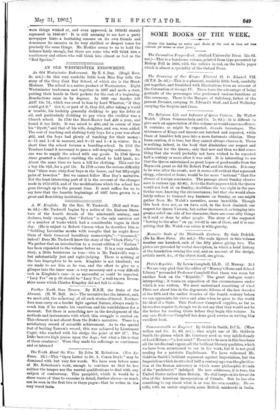A. W. Kinglake. By the Rev. W. Tuckwell. (Bell and
Sons. 4s. 6d.)—Mr. Tuckwell begins by a notice of the Eastern litera- ture of the fourth decade of the nineteenth century, and declares, truly enough, that "Eothen" is the only survivor out of a number of books which had a considerable vogue in their day. (He is unjust to Robert Curzon when he describes him as " fuddling Levantine monks with rosoglio that he might fleece them of their treasured hereditary manuscripts,"—" treasured," indeed! Does Mr. Tuckwell know the story of the "Clark Plato " ?) We gather that an introduction to a recent edition of " Eothen " has been expanded to the volume before us. It is a very readable story, a little boisterous in tone—this is Mr. Tuckwell's way— but substantially just and right-judging. There is nothing of the lues biographica to be seen. Kinglake is not idealised ; we are made to see him as he was, and the effort to give us a glimpse into the inner man—a very necessary and a very difficult task in Kinglake's case—is as successful as could be expected. "Lacy Yea" on p. 63 should be "Lacy Yeo," a well-known Devon- shire name which Charles Kingsley did not fail to utilise.










































 Previous page
Previous page